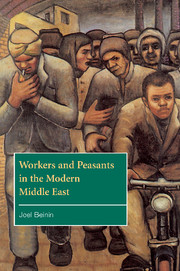
-
Select format
-
- Publisher:
- Cambridge University Press
- Publication date:
- February 2010
- September 2001
- ISBN:
- 9780511612800
- 9780521621212
- 9780521629034
- Dimensions:
- (228 x 152 mm)
- Weight & Pages:
- 0.484kg, 226 Pages
- Dimensions:
- (228 x 152 mm)
- Weight & Pages:
- 0.374kg, 226 Pages
- Subjects:
- Social and Population History, Middle East Studies, Area Studies, History, Middle East History
- Series:
- The Contemporary Middle East (2)
You may already have access via personal or institutional login- Subjects:
- Social and Population History, Middle East Studies, Area Studies, History, Middle East History
- Series:
- The Contemporary Middle East (2)
Book description
Joel Beinin's survey of subaltern history in the Middle East demonstrates lucidly and compellingly how the lives, experiences and culture of working people can inform our historical understanding. Beginning in the middle of the eighteenth century, the book charts the history of peasants, urban artisans and modern working-classes across the lands of the Ottoman empire and its Muslim-majority successor-states, including the Balkans, Turkey, the Arab Middle East and North Africa. Inspired by the approach of the Indian Subaltern Studies school, the book is the first to offer a synthesized critical assessment of the scholarly work on the social history of this region for the last twenty years. It offers insights into the political, economic and social life of ordinary men and women and their apprehension of their own experiences. Students will find it rich in narrative detail, and accessible and authoritative in presentation.
Reviews
‘… state of the art survey of subaltern history in the Middle East … the book is the first to present a synthetic critical assessment of the scholarly work on the social history of this region for the last twenty years. it offers new insight into the political, economic and social life of ordinary men and women and their apprehension of their own experiences. Students will find it rich in narrative detail, and accessible and authoritative in presentation.’
Source: Discourse
Contents
Metrics
Altmetric attention score
Full text views
Full text views help Loading metrics...
Loading metrics...
* Views captured on Cambridge Core between #date#. This data will be updated every 24 hours.
Usage data cannot currently be displayed.
Accessibility standard: Unknown
Why this information is here
This section outlines the accessibility features of this content - including support for screen readers, full keyboard navigation and high-contrast display options. This may not be relevant for you.
Accessibility Information
Accessibility compliance for the PDF of this book is currently unknown and may be updated in the future.


